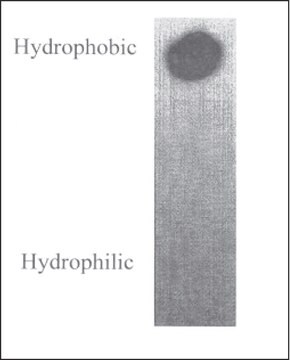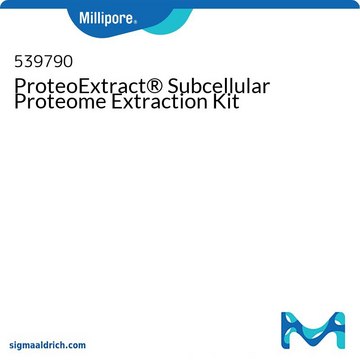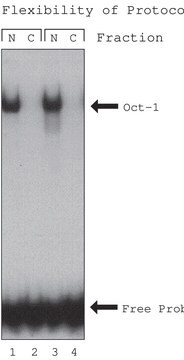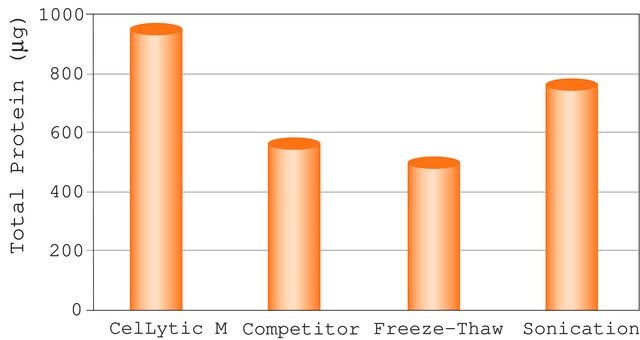444810
ProteoExtract® Native Membrane Protein Extraction Kit
Sinónimos:
Membrane protein extraction kit
Iniciar sesiónpara Ver la Fijación de precios por contrato y de la organización
About This Item
UNSPSC Code:
41106500
NACRES:
NA.77
Productos recomendados
usage
sufficient for 20 extractions
manufacturer/tradename
Calbiochem®
storage condition
OK to freeze
technique(s)
protein extraction: suitable
input
sample type: mammalian tissue
shipped in
ambient
storage temp.
2-8°C
General description
A convenient kit for the isolation of native integral membrane and membrane-associated proteins, without the need for ultracentrifugation. Extraction is based on association of proteins with cellular membranes rather than on their hydrophobicity. Resulting samples are suitable for use in functional assays, 2-D gel electrophoresis, and other applications.
Membrane proteins represent only one-third of the proteins encoded by the human genome, but they represent more than two-thirds of the known protein targets for drugs. Therefore, approaches to prepare and characterize membrane proteins are of significant interest for drug discovery. However, due to their hydrophobic nature, membrane proteins are more difficult to analyze than soluble proteins. In addition to the intrinsic difficulty of solubilization, membrane proteins are challenging because of their general low abundance. Thus, the challenges for sample preparation of membrane proteins are effective solubilization and selective enrichment, ideally keeping proteins in a non-denatured state.
Note: 1 kit is sufficient for up to 20 sample extractions.
Components
Wash Buffer, Extraction Buffer 1, Extraction Buffer 2, Protease Inhibitor Cocktail, and a user protocol.
Warning
Toxicity: Multiple Toxicity Values, refer to MSDS (O)
Principle
The ProteoExtract® Native Membrane Protein Extraction Kit is designed for the isolation of native membrane proteins from a broad range of mammalian samples, including:
• Adherent tissue culture cells
• Suspension grown tissue culture cells
• Frozen cell pellets
• Tissues
• Adherent tissue culture cells
• Suspension grown tissue culture cells
• Frozen cell pellets
• Tissues
Preparation Note
The amount of buffer required for each extraction is dependent upon the amount of starting cell material.
Storage and Stability
• Wash Buffer
Store at 4°C.
• Extraction Buffers I & II
The Extraction Buffers I and II can be stored at 4°C for up to 6 month.
For prolonged storage, freeze the buffers in convenient aliquots at -20°C. Before extraction, buffers must be thawed at room temperature (RT). After thawing, mix components by gently shaking or vortexing. Avoid repeated freezing and thawing!
• Protease Inhibitor Cocktail
The Protease Inhibitor Cocktail is supplied in DMSO and can be stored at 4°C up to 6 months. For prolonged storage, freeze the cocktail in convenient aliquots at -20°C. During the sample preparation procedure it must be kept at RT to prevent freezing of DMSO.
Store at 4°C.
• Extraction Buffers I & II
The Extraction Buffers I and II can be stored at 4°C for up to 6 month.
For prolonged storage, freeze the buffers in convenient aliquots at -20°C. Before extraction, buffers must be thawed at room temperature (RT). After thawing, mix components by gently shaking or vortexing. Avoid repeated freezing and thawing!
• Protease Inhibitor Cocktail
The Protease Inhibitor Cocktail is supplied in DMSO and can be stored at 4°C up to 6 months. For prolonged storage, freeze the cocktail in convenient aliquots at -20°C. During the sample preparation procedure it must be kept at RT to prevent freezing of DMSO.
Legal Information
CALBIOCHEM is a registered trademark of Merck KGaA, Darmstadt, Germany
PROTEOEXTRACT is a registered trademark of Merck KGaA, Darmstadt, Germany
signalword
Warning
hcodes
Hazard Classifications
Aquatic Chronic 3 - Eye Irrit. 2 - Skin Irrit. 2
Storage Class
10 - Combustible liquids
Certificados de análisis (COA)
Busque Certificados de análisis (COA) introduciendo el número de lote del producto. Los números de lote se encuentran en la etiqueta del producto después de las palabras «Lot» o «Batch»
¿Ya tiene este producto?
Encuentre la documentación para los productos que ha comprado recientemente en la Biblioteca de documentos.
Wenlu Li et al.
Journal of cerebral blood flow and metabolism : official journal of the International Society of Cerebral Blood Flow and Metabolism, 39(10), 2048-2060 (2018-05-23)
Blood-brain barrier (BBB) disruption in neurological disorders remains an intractable problem with limited therapeutic options. Here, we investigate whether the endothelial cell membrane protein annexin A2 (ANXA2) may play a role in reducing trans-endothelial permeability and maintaining cerebrovascular integrity after
Meenakshi Upreti et al.
Journal of molecular medicine (Berlin, Germany), 91(4), 497-506 (2012-10-24)
The present study reports on a new strategy for selective, radiation therapy-amplified drug delivery using an antiangiogenic 33-a.a., tumor vasculature-targeting ligand, anginex, to improve the therapeutic ratio for strategies developed against solid tumors. Our findings indicate that galectin-1 is (a)
Robyn T Sussman et al.
Frontiers in oncology, 10, 302-302 (2020-03-27)
We developed a computational pipeline designed to use RNA sequencing (n = 136) and gene expression profiling (n = 250) data from neuroblastoma tumors to identify cell surface proteins predicted to be highly expressed in MYCN amplified neuroblastomas and with
Jacqueline Bezençon et al.
Journal of pharmaceutical sciences, 110(1), 404-411 (2020-10-16)
Recent studies have focused on coproporphyrin (CP)-I and CP-III (CPs) as endogenous biomarkers for organic anion transporting polypeptides (OATPs). Previous data showed that CPs are also substrates of multidrug resistance-associated protein (MRP/Mrp) 2 and 3. This study was designed to
Masamitsu Shimazawa et al.
Journal of neurochemistry, 107(1), 279-290 (2008-08-12)
Here, we examined whether amyloid-beta (Abeta) protein participates in cell death and retinal function using three types of transgenic (Tg) mice in vivo [human mutant amyloid precursor protein (APP) Tg (Tg 2576) mice, mutant presenilin-1 (PS-1) knock-in mice, and APP/PS-1
Nuestro equipo de científicos tiene experiencia en todas las áreas de investigación: Ciencias de la vida, Ciencia de los materiales, Síntesis química, Cromatografía, Analítica y muchas otras.
Póngase en contacto con el Servicio técnico









